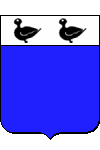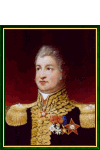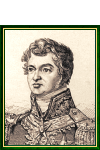Joseph Léopold Sigisbert Hugo
Count of Sigüenza
Pronunciation:

Joseph Léopold Sigisbert Hugo was born on November 15, 1773 in Nancy to a carpenter father and a governess mother. As a child, he received a solid education at the city's royal college, but, gifted with a strong personality and little inclination towards studies, his only dream was to don a soldier's uniform.
It took him three attempts to achieve this goal. The first two, in 1788 and 1789, failed because he was too young, and he was sent home. His third engagement, this time in the armies of the Republic, was signed on April 23, 1791. He was now a soldier.
Ambitious and patriotic (he called himself Brutus Hugo at the time), Léopold quickly made his mark. Still a non-commissioned officer in 1792, he was already an adjutant-major (captain) in May 1793 when his regiment left the Rhine for the Vendée.
He spent almost four years there, during which time he took part in the fighting and perhaps, although he denies it in his memoirs, in the terrible repression of the population. It was also here, in the town of Châteaubriant, that he met Sophie Trébuchet, his future wife, who would go on to bear him three sons, including Victor Hugo.
In 1797, Léopold's immediate superior, who exerted a calming influence on him, was transferred. Captain Hugo became involved in intrigues designed to speed up his career, which had the opposite effect. Assigned to Paris as rapporteur to the 17th division's council of war, he spent some time in Madame de Staël's circle, where the opposition to the Directoire met, before getting married on November 15, 1797, and requesting his transfer.
He then began a period of wandering from garrison to garrison, ending when a friend of his wife's got him a place on Jean Victor Marie Moreau's staff.
It was 1800, and Moreau was about to defeat the Austrian army at Hohenlinden. During the campaign, Hugo was promoted to battalion commander on the battlefield of Mosskirch (May 5). He then took part in the negotiations that led to the Peace of Lunéville, and became governor of the town.
But he hoped for more, and chose to apply for a more exposed position to secure faster advancement. He was sent to Besançon. His third son, Victor Hugo, was born there in 1802, but that same year, Léopold had the unfortunate idea of denouncing his colonel's trafficking in leave. The colonel, as expected by the informer, was arrested, but the affair caused such a scandal that the entire regiment was moved. Léopold Hugo found himself in Corsica, where he languished for several years.
This exile, interspersed with a stay on the island of Elba between June 1803 and June 1804, came to an end in September 1805. Hugo was transferred to Italy and assigned to Marshal Masséna's 8th Corps. After distinguishing himself at the battle of Caldiero, he joined the troops placed at Joseph Bonaparte's disposal to conquer his kingdom of Naples. On February 14, 1806, he entered Naples with the new king. Convinced by Bonaparte that his past intrigues definitively ruled out any hope of a career in the French armies, he transferred to the service of Naples on September 28.
For leading the fight against the bands of nationalist bandit Michel Pezza, known as Fra Diavolo (although this is disputed, as Hugo's name does not appear on any official document), Leopold became major of the Royal-Corsican regiment of Naples in November 1806, then governor of the province of Avellino, in Apulia. His career finally took off. On February 23, 1808, he was appointed colonel; shortly afterwards, he was made commander of the Royal Order of the Two Sicilies; in May, he became maréchal des logis of the palace; in July, Joseph Bonaparte, now King of Spain, called on him.
Léopold Hugo joined him in August, and was immediately showered with honors and leading positions. On December 6, he was appointed chef de corps of the Royal Etranger regiment; on August 20, 1809, he became marshal de camp (brigadier general); on September 27, sub-inspector general of corps formed or to be formed. To these ranks were added the distinction of Commander of the Royal Order of Spain and the governments of Aquila, Guadalajara and Segovia.
For the next four years, he fought with some success against the Spanish guerrillas, at the head of his Royal Etranger, which specialized in counter-guerrilla warfare (then known as "petite guerre"). Having successfully subdued the regions in which he intervened, Hugo was rewarded with the title of Count of Sigüenza (which was never registered by the Council of the Seal of Titles). On October 1, 1811, he became chief of staff of the Madrid government, then commander of Madrid in March 1812. On June 24, 1813, he was appointed Joseph Bonaparte's first aide-de-camp, three days after the battle of Vitoria, during which he saved the king and his family by stopping an English column.
By then, Spain had already been lost to the French. Hugo left behind most of his possessions and titles. In September, he was sent to Saxony and, on January 9, 1814, was given command of the town of Thionville, where he held out for ninety-eight days against the assaults of the Russian, Prussian and Hessian coalition forces. He only surrendered the town on April 14, following the official announcement of Napoleon I's abdication.
On September 12, he was placed on demi-solde, then on November 21 on non-activity, a disgrace softened by the rank of maréchal de camp, a cross of the Legion of Honor and the title of chevalier de Saint-Louis.
Once again sent to Thionville during the Hundred Days, he only surrendered on July 7, 1815, by order of the king. On November 13, he was reinstated to non-active status, and retired on February 16, 1825, despite his efforts to return to service. Appointed honorary lieutenant-general (major general), he retired to Blois, where he spent his time writing reminiscences, essays on military tactics, poetry, theater and a novel, Aventure tyrolienne, published under the pseudonym Sigisbert.
Joseph Léopold Sigisbert Hugo died of apoplexy on January 29, 1828. He was buried in the Père Lachaise cemetery, 27th division.
"General Joseph Léopold Sigisbert Hugo". French school of the nineteenth century.

General Hugo was a gifted storyteller, who captivated his children (first and foremost Victor) with tales of his exploits. The famous Give him a drink anyway
from the poem Après la bataille, for example, comes straight from his father's account of a similar episode in Spain.
Other portraits

"General Hugo". French school of the nineteenth century.

"General Joseph Léopold Sigisbert Hugo". Gravure of the nineteenth century.